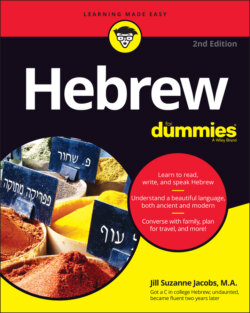Читать книгу Hebrew For Dummies - Jill Suzanne Jacobs - Страница 29
HEBREW AS THE HOLY TONGUE — DON’T BITE IT
ОглавлениеJudaism has always regarded Hebrew as a sacred language. Hebrew is often referred to as לְשׁוֹן הַקֹּדֶשׁ (le-shohn hah-koh-desh; the Holy Tongue), and even the Hebrew word for letter, אוֹת (oht), means “sign” or “wonder.” In fact, during the period of Hebrew’s revival as a spoken language, some people objected, saying that Hebrew was simply too sacred for saying things like “Take out the garbage.”
Also, all Hebrew letters have numeric value. A particular form of Jewish numerology called גִּמַּהְרִיָּה (gee-meht-ree-yah) plays on the words’ numeric values. Both the Hebrew word for wine (יַיִן;yah-yeen) and secret (סוֹד;sohd) have the same numerical value. The Talmud has a saying, “When the wine goes in, secrets come out!” Other Jewish sacred writings claim that the Hebrew letters are the manifestation of divine energy patterns and even that the universe’s DNA is composed of Hebrew letters.
A 13th-century mystic, Rabbi Abraham Abulafia, created a form of Jewish meditation, similar to yoga, based on the Hebraic forms. And a 16th-century mystic, Rabbi Isaac Luria, developed another form of meditation based on visualizing the Hebrew letters.
Are you totally confused yet? What difference does adding a Dagesh make? In the Sephardic pronunciation that Israelis and most Hebrew speakers today use, adding a Dagesh almost never makes a difference in pronunciation. But in a few cases, when a Dagesh is placed within a letter (always a consonant), it changes the way you pronounce that consonant. When you add a Dagesh to the letter ו (Vet), for example, the V sound becomes a B sound, and you pronounce the letter like bet. When you pair a Dagesh with the letter ḥaf, the ḥ sound becomes a K sound, so the sound of that letter becomes kaf. Finally, the letter פ (Fey) with a Dagesh becomes a פּ (Peh).
